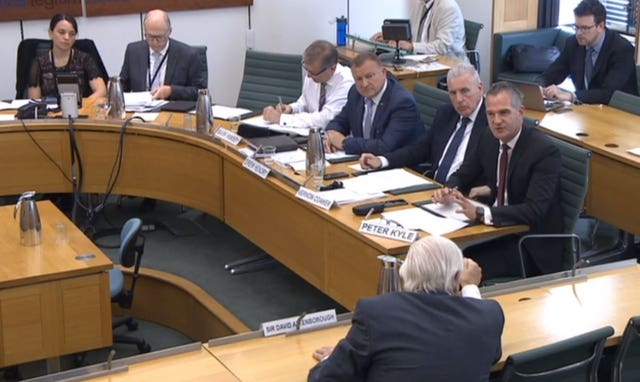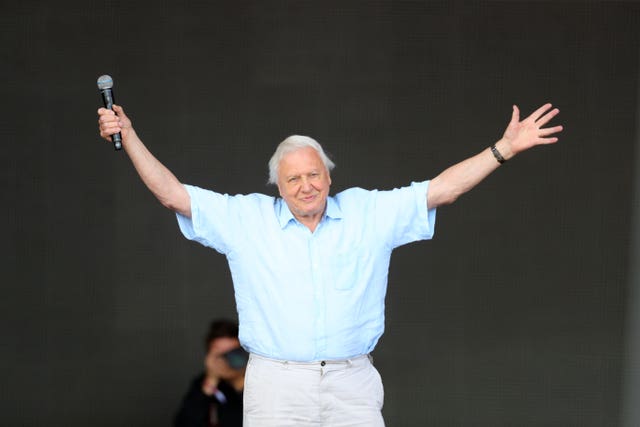A failure to tackle climate change will bring great “social unrest” and increased pressure from immigration, Sir David Attenborough has warned.
The TV naturalist told MPs that dealing with environmental problems will cost money and will require changes to people’s lifestyles, such as in their diet and with regards to air travel, where the cost of flights will have to go up.
But there are “huge opportunities” for making profits and benefiting from new innovations, he said.
READ MORE: Sainsbury’s trial recycling scheme in Glasgow which will put cash in shoppers' pockets
The veteran broadcaster was giving evidence to Parliament’s Business, Energy and Industrial Strategy Committee as part of its inquiry into clean growth and international climate change targets.
He said the most vivid example he had witnessed of the changing climate was revisiting the Great Barrier Reef and seeing how it had been bleached because of rising temperatures.
Sir David Attenborough speaking to us this morning on #netzero and #climatechange, 'We are changing the climate in a way that is irreversible…if we carry on as we are…' pic.twitter.com/5HjjKZP1Ux
— Business, Energy and Industrial Strategy Committee (@CommonsBEIS) July 9, 2019
Visiting the Australian landmark in the 1950s, Sir David said he had “the extraordinary experience of diving on the reef and suddenly seeing this multitude of fantastic, beautiful forms of life”.
But upon his return 10 years ago, he said: “Instead of multitudes of wonderful forms of life, I was struck by how it was bleached white because of the rising temperatures and increasing acidity of the seas.”
Sir David also remembers visiting a glacier on South Georgia, in the southern Atlantic Ocean, and then returning decades later to the same spot where the glacier was no longer visible because it had retreated so far.
 Sir David gives evidence to the House of Commons Business, Energy and Industrial Strategy Committee (House of Commons/PA)
Sir David gives evidence to the House of Commons Business, Energy and Industrial Strategy Committee (House of Commons/PA)
When he began making documentaries 50 years ago, he did not believe it was possible people could change the climate and, he said, “I’m not by nature a propagandist”.
But he added: “If you become aware of what is happening to the natural world, you don’t have any alternative.”
READ MORE: Letters: Now is the time to establish a National Emergency Commission
Quizzed on whether the UK’s new legal “net zero” target for 2050 or whether calls from campaigners for a 2025 goal were realistic, Sir David said: “The question is what is practically possible, and how can we take the electorate with us in dealing with these problems.
“Dealing with problems means we’ve got to change our lifestyle.”
 Sir David Attenborough made a surprise appearance at the Glastonbury Festival (Aaron Chown/PA)
Sir David Attenborough made a surprise appearance at the Glastonbury Festival (Aaron Chown/PA)
And while the 93-year-old said the issue was unlikely to affect him, “the problems of the next 20 to 30 years are major problems that are going to cause great social unrest and great changes in what we eat and how we live”.
Sir David warned: “The problem you’re opening now is a very serious one. If the world climate change goes on, it is going to be facing huge problems with immigration.
“Large parts of Africa are going to be even less inhabitable than they are now, and there will be major upsets in the balance between our national boundaries.
“These kind of problems are going to grow inexorably and we are going to have to decide what we do about it, that’s going to happen.”
READ MORE: John Sergeant: BBC right to let David Attenborough campaign against climate change
He said industry should be encouraged to invest in new technologies for generating, storing and transporting energy, such as batteries, and that he thought progress was being made.
Sir David backed the target to cut emissions to net zero by 2050, which the UK has now set in law, saying it was a “tough target”, but he hoped it could be achieved.
Asked if he was optimistic about the future, he said: “I feel an obligation – the only way you can get up in the morning is to believe we can do something about it, and I think we can.”
He said the growing voice of youngsters on environmental issues was a source of hope, and referring to the young people who had come to the committee hearing to hear him speak, he said: “It’s their futures that are in our hands.”



Why are you making commenting on The Herald only available to subscribers?
It should have been a safe space for informed debate, somewhere for readers to discuss issues around the biggest stories of the day, but all too often the below the line comments on most websites have become bogged down by off-topic discussions and abuse.
heraldscotland.com is tackling this problem by allowing only subscribers to comment.
We are doing this to improve the experience for our loyal readers and we believe it will reduce the ability of trolls and troublemakers, who occasionally find their way onto our site, to abuse our journalists and readers. We also hope it will help the comments section fulfil its promise as a part of Scotland's conversation with itself.
We are lucky at The Herald. We are read by an informed, educated readership who can add their knowledge and insights to our stories.
That is invaluable.
We are making the subscriber-only change to support our valued readers, who tell us they don't want the site cluttered up with irrelevant comments, untruths and abuse.
In the past, the journalist’s job was to collect and distribute information to the audience. Technology means that readers can shape a discussion. We look forward to hearing from you on heraldscotland.com
Comments & Moderation
Readers’ comments: You are personally liable for the content of any comments you upload to this website, so please act responsibly. We do not pre-moderate or monitor readers’ comments appearing on our websites, but we do post-moderate in response to complaints we receive or otherwise when a potential problem comes to our attention. You can make a complaint by using the ‘report this post’ link . We may then apply our discretion under the user terms to amend or delete comments.
Post moderation is undertaken full-time 9am-6pm on weekdays, and on a part-time basis outwith those hours.
Read the rules hereComments are closed on this article